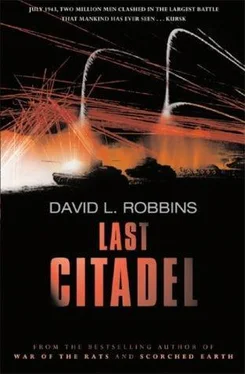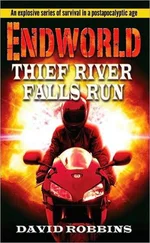He looked back across the littered and busy ground to the repair tent, recalling the beating that brave tank had taken, the last Tiger in Leibstandarte . He had only that one left, to put into battle at the head of Mark IIIs and IVs and captured Soviet tanks. He brought his eyes around to the gunner, who’d helped keep this one giant tank alive for him to command.
‘Good,’ he said.
Luis was not in the tent when the mechanics lowered the Tiger. A lieutenant from Leibstandarte, alerted by Major Grimm, came to greet him with orders. He was instructed to proceed in his Tiger immediately northwest to Sukho-Solotino. Leibstandarte was assigned along with Totenkopf to reorient away from the northeast, to mount an attack in the direction of the Oboyan road, then plunge directly at Kursk. The third SS division, Das Reich, was to hold down the right flank instead of Army Group Kempf, which had barely gotten out of the gate east of Belgorod and was continuing to lag. Receiving his orders, Luis cast his thoughts back to the map room, to fat Grimm and chain-smoking Breit pacing beside the board. He saw the map and how these orders made sense. He thanked the lieutenant and jogged back to the repair tent, excited now, envisioning the long sticks pushing Leibstandarte into position at Sukho-Solotino and then the Oboyan road. One of the black blocks moving against the Red defense line across the road would be his.
Even before he saw it he heard his Tiger’s howling engine in the center of the village, bellowing for him. Beside his tank was a Mark IV that had also been repaired. The Tiger was almost twice the size, its revving engine distinct, the pocks on its surface testaments to the fight in its hide. Men walking past gave the tank a wide berth, like a bull run into the ring belching steam and snot and spoiling for blood. Luis ran to it and climbed the turret to his open hatch. He dropped his legs into the open cupola. The loader handed him his padded helmet, he strapped it on and attached the throat microphone. The Tiger waited, vibrating around him. Luis pulled his goggles down over his eyes, to ride standing like Thoma over the barley and wheat fields, to crush the sunflowers and mustard stalks between him and Sukho-Solotino. He glanced at Thoma’s blood and spoke into the intercom, ‘Driver, forward.’
July 8
0920 hours
8 kilometers south of Sukho-Solotino
The sun was unstinting, a Spanish sun over the fields that would become battlefields this morning. Luis gazed north across a bland expanse of steppe grass and patchy greens where young crops had not yet been stamped on. Ten kilometers to his left, the flat reach was split by the ribbon of the Oboyan road, his objective. In his way was the defended town of Sukho-Solotino. Behind Sukho-Solotino was the last of the three principal Soviet defense lines, the most dangerous and desperate of the Red barriers. Behind those positions, idling on the steppe, was a full-strength Russian reserve army waiting to engage the SS forces now draining themselves in the trenches and minefields on this path to Kursk. Luis’s fight would be here, across this broad and dangerous field, in this tiny piece of the arena.
Below the ridge, two grenadier battalions of Leibstandarte - worn down to a thousand men each – had dug in, turning captured Russian defense works against their creators. A dozen batteries of antitank artillery were leveled at Sukho-Solotino. Sappers crawled through the crop stalks to pull mines out of the ground. Farther out in the grasslands, T-34 hulks smoldered; apparently there had already been a Russian attack at dawn, repulsed.
A soldier flagged Luis down and pointed him into a position in the middle of five other tanks, all Mark IVs. The gunner said in the intercom that this was their command platoon. Luis barked to the driver to bring the Tiger into place, then shut down to save petrol. A sergeant-major climbed up on the deck to salute and welcome him. The man was in his forties, flat-nosed, and badly shaven. Luis could tell he was very glad to have a Tiger back in the regiment, and didn’t give a damn that the man commanding it was a frightful-looking chap and not Erich Thoma.
‘Captain, well done. You got here just in time.’
Luis aimed his chin at the battle detritus in the field, and beyond to Sukho-Solotino. ‘What happened?’
The sergeant-major shrugged, hardened by carnage. ‘Nothing much. They made a halfway charge at us this morning at sunup. We knocked out twenty T-34s with no losses of our own. They ran straight into the infantry, and the antitank guns did the work. The tanks didn’t even leave the hill. You know the Reds. Twenty of their tanks dead, and they got nothing for it. It just winds them up and makes them madder.’
Luis liked that phrase ‘You know the Reds.’ It said to him, Fellow soldier.
‘We figure they’ll hit back anytime now,’ the sergeant-major continued. ‘After we scatter this next attack, we’ll move down and take the town.’ He struck a palm against the Tiger’s turret. ‘Having this big son of a bitch back in the lead will make it go a lot better.’
Luis took a moment to unstrap his soft helmet and pull it off. He ran a bony hand through his hair. ‘This big son of a bitch will not be in the lead, Sergeant-major. Your tank will be.’
The man reared back at this, pulling his face away and wincing, as though Luis had disappeared and another had popped into his place, a coward.
‘Captain, I don’t think…’
‘I didn’t ask what you think, Sergeant-major.’
The man was expected to close his mouth and say no more, but he did not, perhaps, Luis thought, because he was an older fellow and believed he knew best, that is what happens with every year.
‘Captain, if I might. Captain Thoma…’
Luis interrupted again; his voice was that of a man slapping the hand of a reaching child.
‘Captain Thoma commanded an armored company in a regiment that lost thirteen of its fourteen Tigers in four days of fighting. Captain Thoma and others lost those tanks to improper use and unnecessary risk, and was lucky not to have lost this one, as well. Captain Thoma, you will also note, is dead.
‘Sergeant-major, the Tiger tank was not designed to be trotted out in front at the first sign of trouble. It is the ultimate weapon of the panzer unit, and from now on will be used solely in that role in this company. When the assault begins, this platoon will form a Panzerkeil . You and your Mark IV will take the point. I will follow inside the wedge. The three other platoons will form Panzerkeile as well and take up positions to our front and sides. You and the other Mark IVs will protect this Tiger from mines and infantry assaults. When the Soviet tanks appear and the decisive moment in the battle arrives, you will then have a living Tiger beside you and not a dead one. Do you understand?’
The sergeant-major had gone stiff. ‘Yes, sir.’
‘The Tiger was designed with one purpose, Sergeant-major. It was brought to Kursk for that purpose. To meet and defeat the Russian tank on the battlefield. No other target warrants my attention.’
‘Yes, sir, Captain.’
‘Instruct the other platoon leaders that I will see them here in ten minutes.’
The sergeant-major did not approve, Luis knew this from the blank face he mounted while listening. The man said, ‘Yes, sir,’ and clambered off the Tiger. Luis watched him go. The sergeant-major would tell the three other platoon leaders and nudge them into dislike of the new captain, and his tactic, as well. No matter, Luis thought, and not to be unexpected. They’ve had the maverick Thoma and fourteen Tigers charging to the front, taking their hits for them and delivering massive blows to clear the way. In the process Thoma squandered all but this last Tiger, and stopped a bullet for good measure. Luis had no intention of rolling over an undetected mine or losing a tread to a cheap Soviet round in the flank. This last Tiger was a gift: It would not be frittered away while in his hands.
Читать дальше












